POPE BENEDICT: NO SEATBELT
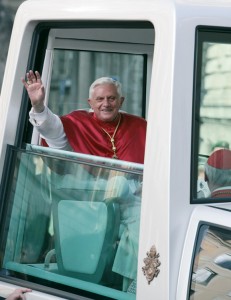
The Vatican spokesman, Jesuit Father Federico Lombardi, said that the complaint was not being taken seriously at the Vatican.
Father Lombardi said it was well known that the popemobile does not travel long distances, moves at a very slow speed and doesn’t generally run the risk of encountering other vehicles in its path.
“The Pope turns continually to the right and to the left to greet and bless the faithful. Often he gets up and takes in his arms babies to bless, to the joy of the parents and everyone present. All these gestures presume a certain freedom of movement,” the spokesman said.
German news reports said the complaint against the Pope was filed in the city of Dortmund following Pope Benedict’s September visit to his homeland. The pontiff traveled frequently in his popemobile during stops in Berlin, Erfurt, Etzelsbach and Freiburg.
The complaint said that on all these occasions the Pope had failed to use the seat belt as required by German law and that, as a repeat offender, he should be fined the maximum of 2,500 euros ($3,400). According to the German reports, the lawyer who filed the complaint said his client was primarily concerned about the safety of the 84-year-old Pope.
RETIREMENT
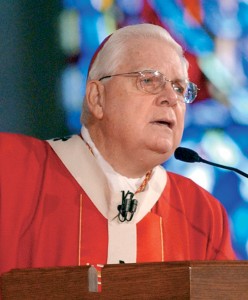
Pope Benedict XVI named Spanish Archbishop Santos Abril Castello, the Vatican’s vice chamberlain, to the post.
Cardinal Law turned 80 on November 4, at which time he stopped holding various Roman Curia posts.
Pope John Paul II appointed Cardinal Law to the position in May 2004, about two years after he resigned as Boston’s archbishop amid criticism of his handling of clerical sexual abuse cases in the archdiocese.
Since his appointment to the position in Rome, Cardinal Law has kept a relatively low profile. One of his regular duties as archpriest is to celebrate Mass on August 5, a special service marking the date in 358 when Mary caused snow to fall on the spot of the basilica to indicate where she wanted a church built in her honor.
It is a popular Church event, marked by white flower petals being released from the ceiling of the basilica.
THEOLOGIANS, APOLOGISTS — WHAT THE NEW BISHOPS HAVE TO BE
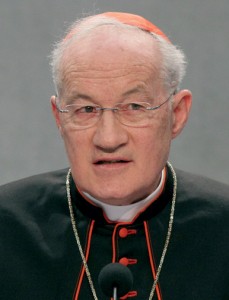
Ending his first year as Prefect of the Congregation for Bishops, Cardinal MARC OUELLET has surveyed his work in an interview with Gianni Cardinale for Avvenire, the newspaper of the Italian episcopal conference.
In the interview, he revealed among other things that it often happens, “more than I could have expected,” that the candidate chosen to be made a bishop does not accept the appointment.
He indicated the reasons for such refusals in the growing difficulty of fulfilling the role, in a society in which the bishops are under public attack, “in part as a result of the scandals and charges concerning sexual abuse.”
As for career ambitions – the cardinal cautioned – if a priest or a bishop aspires and maneuvers to be promoted to a prominent diocese, “it is better for him to stay where he is.”
And he concluded the interview by sketching the profile of the bishop the Church needs most today. A bishop who is at the same time a theologian and an apologist, a public defender of the faith: “Today, especially in the context of our secularized societies, we need bishops who are the first evangelizers, and not mere administrators of dioceses. Men who are capable of proclaiming the Gospel. Men who are not only theologically faithful to the magisterium and the Pope, but who are also capable of expounding and, if need be, of defending the faith publicly.”
—Sandro Magister
(English translation by Matthew Sherry)
IN ROME A PLAZA DEDICATED TO THE KNIGHTS OF COLUMBUS
A new piazza near the Circus Maximus honors more than 90 years of charitable work by the Knights of Columbus in Rome. The ceremony on the “Largo Cavalieri di Colombo” at the corner of Viale delle Terme di Caracalla and Via Antonina took place on December 6. Mayor Giovanni Alemanno of Rome officiated, and other dignitaries, including Supreme Knight CARL ANDERSON, attended.
Msgr. Roger Roensch, Director of the Bishops’ Office for United States Visitors to the Vatican, gave a blessing to mark the groundbreaking ceremony.
“The Knights of Columbus are honored to have been able to serve the people of Rome, its local Church, and the Vatican, for nearly a century,” Supreme Knight Carl Anderson said. “The friendship between the Knights of Columbus and the city of Rome has overcome the difficulties of distance, language, customs and even war, precisely because it has been based on the virtue so often extolled by Pope Benedict XVI — charity. We hope that this square will be a reminder of the strength of the transformative power of Christian charity.”
A “LITTLE STORY” ABOUT ABORTION
Famous Italian opera singer Andrea Bocelli last June gave pro-life testimony telling a “little story” about his mother who did not abort him. The story was told at a benefit concert for those affected by the earthquake in Haiti and at once posted by pro-life group on YouTube.
Bocelli started his “little story” this way: A young pregnant wife had been hospitalized for a simple attack of appendicitis. The doctors had to apply some ice on her stomach and when the treatments ended the doctors suggested that she abort the child. They told her that would be the best solution because the child would doubtless be born with some kind of disability. But the courageous young wife decided not to terminate the pregnancy, and the child was born.
Bocelli then said: The woman was my mother, I was the child.
This was the first time Bocelli had ever told the story publicly. He told the story, he explained to the Italian daily Il Foglio, to help his priest friend, Father Richard Frechette, a missionary, to collect money to build a new house for homeless children in Haiti.
Andrea Bocelli was born with poor eyesight, and became blind at the age of twelve following a soccer accident. He is regarded as one of the leading opera singers in Italy today.
—Anna Artymiak
DEATH AND SUFFERING
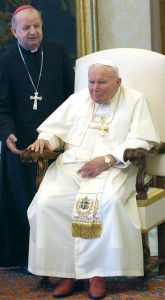
Of course, he was referring to Blessed John Paul II.
Many spoke of John Paul’s teachings on suffering during the 27th International Conference sponsored and organized by the Pontifical Council for Health Care Workers on “Pastoral Care at the Service of Life in the Light of the Teaching of Blessed John Paul II,” from November 24 to 26 in Rome.
“Suffering,” Dsiwisz said, “accompanied the Holy Father throughout his entire life, in different ways. From the beginning to the end. But he received these sufferings, these diseases, as a gift from the Lord. After the assassination attempt (in 1981) he said: this is a grace for me! The Pope wanted to suffer for the Church and for humanity. As all the saints do.”
Karol Wojtyla taught us that suffering is never useless. “He has restored the dignity of death and suffering,” the cardinal said. “Today there is a cult of beauty and strength, of youth, but he showed that suffering has a redemptive value to humans and also for society.” And then he remembered the last hours of the Pope’s life. “When one goes to eternal life, to the House of the Lord, most are afraid. I did not see fear on his face. He prepared himself requesting the reading of the Gospel of St. John, nine chapters which speak of love, and with these words he passed to the other life.”
—Angela Ambrogetti
SWISS GUARD ADVENT CONCERT
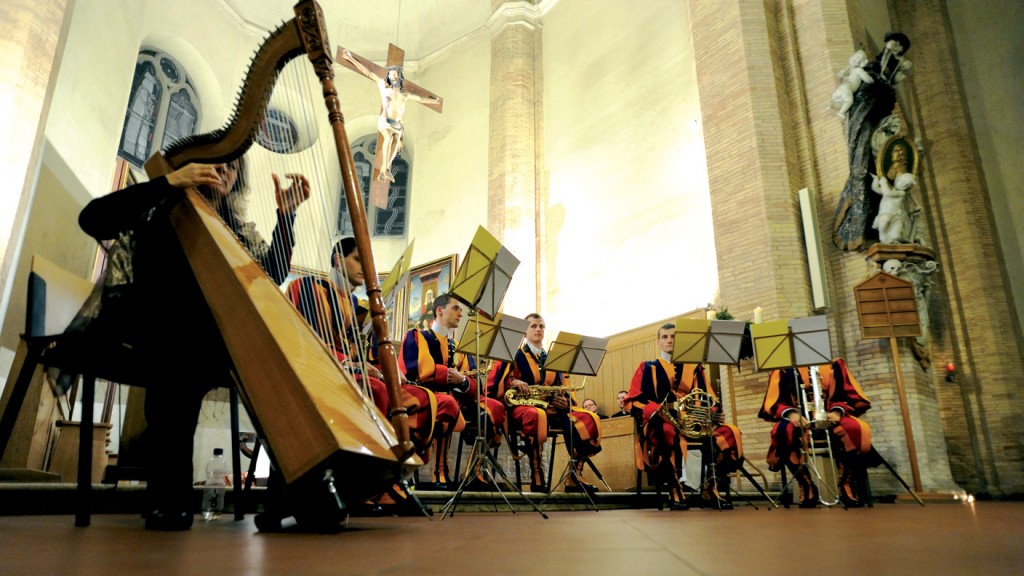
Regularly, the missionary section collects money thanks to the Swiss Guard souvenir shop, where people can find many interesting ideas for gifts, from the famed high-quality Swiss watches to soccer scarves, books on the Guard or a USB pendrive in the shape of a Swiss Guard.
Another occasion reserved only for the members of the Guard is a charitable evening in honor of St. Sebastian, one of the Swiss Guard’s patron saints whose feast falls on January 20.
The Advent concert was organized by the Chaplain de Raemy and the Captain of the Guard, Frowin Bachmann. The concert was mostly addressed to German-speaking citizens of Rome coming for the Masses to the ancient German in the Vatican.
The Swiss Guard band performed at the event, as it does for the swearing-in ceremony on May 6 each year. Daniela Lorenz is a Swiss artist, one of the rare female experts in Europe on the Paraguayan harp. Together with the Swiss Guard band, she presented mostly German Christmas carols, but also Latin American songs and one from America: “Jingle Bells.”
Text by Anna Artymiak
Photo by Katarzyna Artymiak

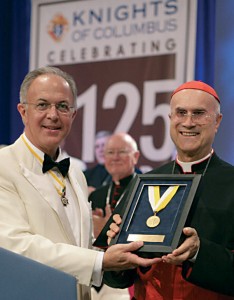
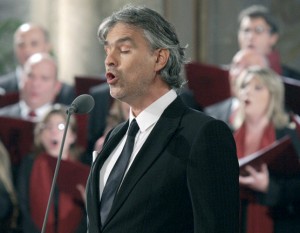



Facebook Comments